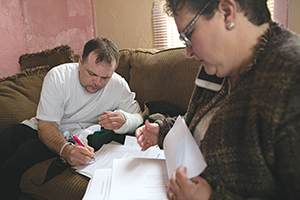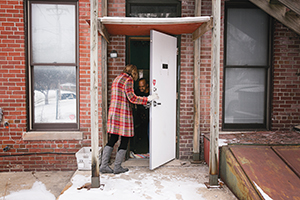By MARGARET GILLERMAN
The coming together of two hospitals for the common good has markedly improved access to health care for 111 vulnerable, low-income residents in the Enos Park neighborhood of Springfield, Ill., and enhanced the quality of life for a few hundred more.
HSHS St John's Hospital, the largest member of the central Illinois division of Hospital Sisters Health System, and Memorial Medical Center, the flagship of Memorial Health System, are funding the three-year, $500,000 Enos Park Access to Care Collaborative. The collaborative was designed to help neighborhood residents navigate the complex health care system and obtain health care and other support services.
Tracey Smith, project director, said results in the first year demonstrate that the program is "remarkably successful" when measured by key indicators affecting health access and living conditions. Smith, who runs the project day by day, also directs population health integration and community health services for the SIU Center for Family Medicine in Springfield. Run by the Southern Illinois University School of Medicine, the center is working with the two hospitals on the access project.

Community health worker Shelly Weatherholt works with a client in his Enos Park home.
Photo by Jason Johnson/SIU Medicine
"We not only met our initial goals to make our clients self-sufficient, but we addressed other needs, such as housing and referrals to social service agencies," Smith said. The first-year impact statement covered the year ending September 2016.
Personal assistance
To accomplish these goals, Smith and three community health workers go into the neighborhood; establish relationships and help residents obtain much-needed dental services, primary care and mental health services, and acquire health insurance. In the first year, 111 Enos Park residents enrolled as full-service clients — the maximum caseload for the community health workers.
The community health workers also address social determinants of health including housing, transportation, food, jobs and neighborhood safety. In the first year of the program, community health workers helped the clients in multiple ways, including by finding safer housing alternatives, setting up households by securing refrigerators or beds, picking up groceries with clients at the food pantry, accompanying clients to doctors' appointments and preparing them for job interviews.
More than 450 neighborhood residents, who were not direct clients, benefited from various outreach programs such as kids' summer enrichment programs, health fairs, elementary school mental health counseling, a bike club, and the Central Illinois Foodbank.
The neighborhood of about 2,300 people is home to many residents who face challenges daily: homelessness, poverty and unemployment — all contributors to poor health outcomes. More than 60 percent of the children live in poverty. Some of the neighborhood's grand old mansions have been subdivided and turned into multifamily housing. The neighborhood, about 36 square blocks, is between St. John's Hospital on the southeast and Memorial on the west. It's immediately north of downtown Springfield within blocks of the state capitol.
Basic human needs
For the hospitals, the program resulted in a 38 percent decline in unnecessary emergency room visits as more patients gained a primary health care provider. At the same time, the health status of clients improved, according to the report.
Kimberly Luz is divisional director of community outreach for HSHS' central Illinois division and St. John's Hospital's liaison to the program. "We launched the Enos Park initiative as a way to improve access to health care, but the success we've seen goes beyond what we anticipated," Luz said.
"Meeting these basic human needs is vital to population health improvement," she said. Many of the service requests the first year were related to housing, food insecurity and clothing. Clients were referred to social service agencies more than 150 times. Clients also were taught basic life skills, which Luz says helped them gain self-esteem and self-confidence.

Tracey Smith, project director for the Enos Park Access to Care Collaborative, visits a client in the Springfield, Ill. neighborhood that is the focus of what she calls a "remarkably successful" program.
Photo by Jason Johnson/SIU Medicine
"One way we measure the program success is through a self-sufficiency scale, which looks at a client's ability to succeed in specific situations as well as their belief in their ability to succeed," Luz said. "We have seen clients graduate out of our program because they have become more self-sufficient and have learned how to better navigate social services, health care services, day-to-day life and crisis events that occur."
By the numbers
As demand for services grew over the first year, Smith hired additional community health workers, growing the program to include one full-time and two part-time positions. The community health workers facilitated 409 primary care provider appointments, 44 mental health appointments, 40 dental appointments and 983 transportation trips. They accompanied clients on 290 doctor visits.
Of the 111 first-year clients, the average age was 34. Fifteen were homeless, 31 were parolees. Ninety-six percent of the clients saw a primary care provider at least once during the year; only 22 percent of that same group had seen a primary care provider the year before enrolling in Access to Care.
To serve the wider neighborhood population, the collaborative works with more than 40 partners. Among these are the Enos Park Neighborhood Improvement Association and Third Presbyterian Church, which provides office space for community health workers to meet with clients and hosts community suppers and other neighborhood gatherings.
Reduction in crime
The first year of the program the neighborhood experienced a reduction in violent crime, according to the report. Smith said Springfield police reported a 13 percent reduction in all calls to Enos Park. That has continued into this year. In January, "we had a 30 percent decrease in police calls from the neighborhood," Smith, the program director, said.
Crime was down partly because the staff worked with landlords to evict tenants believed to be involved in criminal activity, Smith said. In a three-block area of Eighth Street, that effort resulted in an 89 percent decline in police calls.
The neighborhood is home to many parolees placed in four halfway houses by the Illinois Department of Corrections. "It's hard for the parolees to get IDs, insurance, medications and primary care doctors if they don't have someone to help them navigate," Smith said. "We allow people to have support as they try to build toward being self-sufficient."
In the second year, the report said, programs are being expanded and an additional part-time community health worker will be hired to help meet the demand. Smith and the Springfield Police Department also are exploring new models of collaboration to address neighborhood issues such as homelessness and crime.
The two Springfield health systems remain strongly committed to the Enos Park Access to Care Collaborative, which is funded through September 2018, and to the concept of collaboration.
"We are encouraged by the outcomes for the first year of the program and the new collaborations that are developing to address community health issues," said Ed Curtis, president and chief executive of Memorial Health System.
Dr. Charles L. Lucore, president and chief executive of St. John's Hospital, said, "As hospitals continue to work toward population health management, it becomes increasingly evident that partnerships are key to improving health outcomes."
Copyright © 2017 by the Catholic Health Association
of the United States
For reprint permission, contact Betty Crosby or call (314) 253-3490.